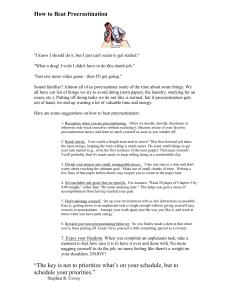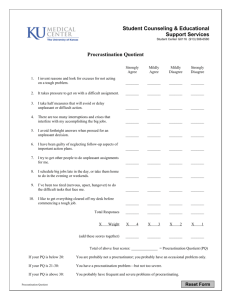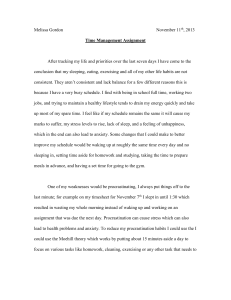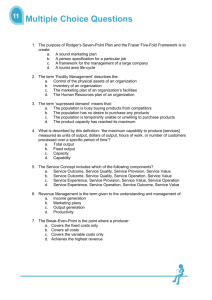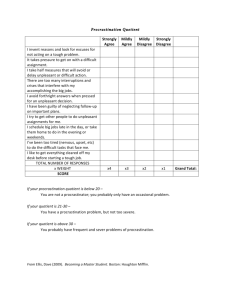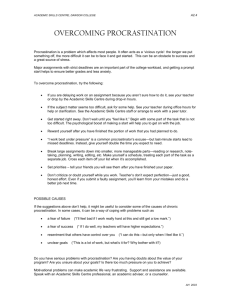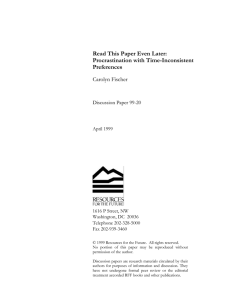Time Management
advertisement
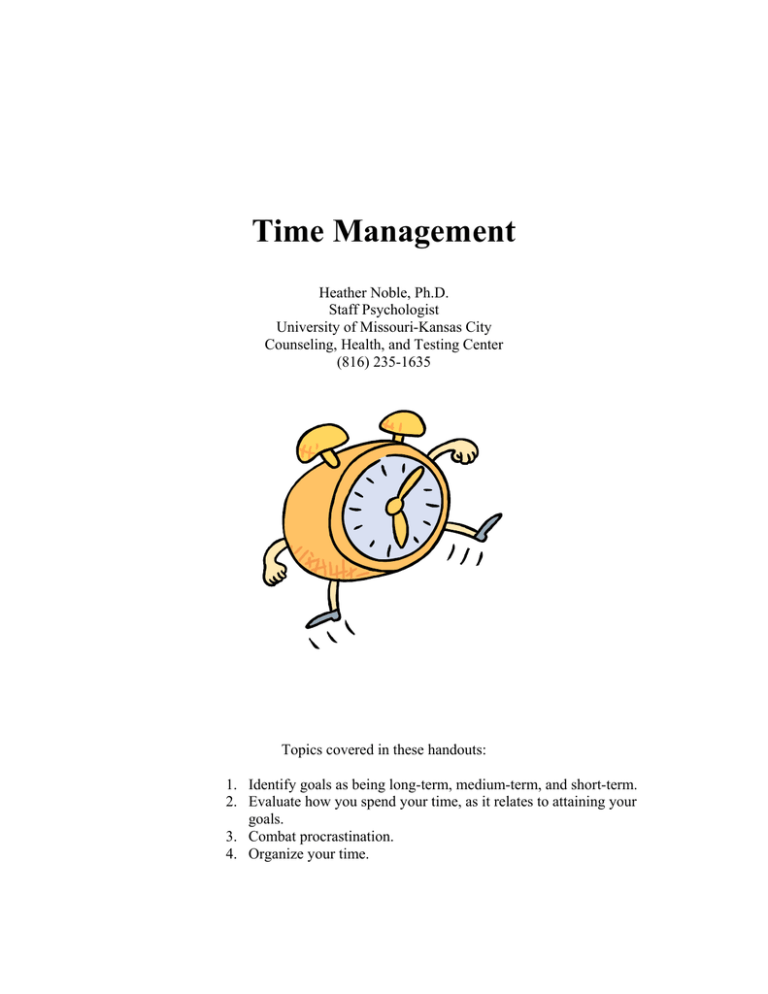
Time Management Heather Noble, Ph.D. Staff Psychologist University of Missouri-Kansas City Counseling, Health, and Testing Center (816) 235-1635 Topics covered in these handouts: 1. Identify goals as being long-term, medium-term, and short-term. 2. Evaluate how you spend your time, as it relates to attaining your goals. 3. Combat procrastination. 4. Organize your time. Examine Goals according to Time Spans 1. Your long-term goals (goals that will take you over five years to accomplish). ________________________________________________________________________ ________________________________________________________________________ ________________________________________________________________________ 2. Your medium-term goals (goals that will take you between one and five years). ________________________________________________________________________ ________________________________________________________________________ ________________________________________________________________________ 3. Your short-term goals (goals that will take from one week to less than one year). ________________________________________________________________________ ________________________________________________________________________ ________________________________________________________________________ Any Other Goals? ________________________________________________________________________ ________________________________________________________________________ ________________________________________________________________________ ________________________________________________________________________ ________________________________________________________________________ ________________________________________________________________________ Evaluate How You Spend Your Time Keep a daily log of your time. Do this in real time, rather than trying to estimate how much time you spent on various activities that fill your day. Most people tend to underestimate how long it takes to do things and to overlook or forget the unplanned activities that pop up during the day. If you really want to learn something new about yourself, stop once an hour during your waking day to record how long it took you to do each activity that you were involved in during that hour. At the very least, get out a notebook after each meal and before bed and write down every activity you engaged in. Keep the time inventory for at least three days. Keep in mind that this time log is designed to help you break down and examine as carefully as you need to the various ways that you use your time, so that later you can decide if you want to spend more or less time engaged in each of these activities. Sample Time Log Activity Waking through Lunch After Lunch through Dinner After Dinner until Sleep Time Evaluate Your Time Log 1. Which of the activities on your daily log are in line with your goals? Mark these activities with a star. 2. Which of the activities on your daily log are not in line with your values and goals? Circle these activities. 3. Are some of your goals being neglected or ignored? ________________________________________________________________________ ________________________________________________________________________ ________________________________________________________________________ ________________________________________________________________________ ________________________________________________________________________ (Activities that reflect these neglected goals may be the very ones that you need to expand or increase in order to bring balance to your life. On the other hand, these neglected goals may actually have a lower priority at this time in your life than your other goals, and you may realize that you feel okay about postponing activities associated with them.) 4. Write down how you will be willing to change your behavior so that it would be consistent with the goals you have been neglecting and want to address at this time. ________________________________________________________________________ ________________________________________________________________________ ________________________________________________________________________ ________________________________________________________________________ ________________________________________________________________________ Combat Procrastination 1. Stop worrying! You probably spend more time worrying about what needs to be done than you would spend by simply doing it. 2. Start small. Once you start doing a task, you may find that it isn't as bad or energy-consuming as you anticipated. 3. Count the cost. Make a list of all the unpleasant aspects of getting something done that you are avoiding and then make a second list of the consequences for putting it off. Look squarely at the discomfort of doing it versus the cost of delay and ask yourself which list contains the greater degree of unpleasantness. 4. Look for the hidden rewards. Look for any payoffs that you may be receiving for not getting the job done. For example, by procrastinating you may be avoiding feeling anxious or facing the possibility of failure. 5. Confront negative beliefs. Are you making statements to yourself such as, "No way am I going to get this done," "I must do it perfectly," "I can't stand the thought of giving a speech in front of a group of strangers," or "I'll fail, so why try?" 6. Double your resistance. Exaggerate and intensify whatever you are doing that is putting off beginning a task. For example, if you are staring at yourself in the mirror in the morning instead of going to work, draw that stare out. Really study all your pores and go over each quadrant of your face minutely! Keep it up until you are really bored and getting to work seems like a more attractive alternative. 7. Take responsibility for each delay. Ultimately, you are the one wasting your precious time. Make a list of each procrastination or escape activity and note how long it took. What are all the positive things you could have accomplished in that time instead? 8. Tie a distasteful activity to an activity that you know you will do. For instance, if you dislike exercise, find a gym you can go to on your way home from work. 9. Reward yourself for doing activities that are unpleasant to you. 10. Finish things. Avoid beginning a new task until you have completed a specific segment of your current task. The experience of finishing something is itself a great reward. Organize Your Time 1. Purchase an organizer. 2. Post copies of your written goals and action plans in places where you will often be reminded of them. 3. Make sure that your list of daily goals and your calendar reflect your longterm, medium-term, and short-term goals. 4. Plan for efficiency. Combine activities that can be done at the same time. Sequence activities to save time. Match tasks to your varying energy levels. 5. Minimize time wasters. Plan ways to avoid as many predictable time wasters as possible (unproductive meetings, activities that lack direction, telephone interruptions), but be realistic enough to schedule some time for unexpected interruptions. 6. Learn to say no. Set limits on how much you are willing to do for others. 7. Make a list of things to do when you're waiting. This may include things such as planning tomorrow's list of goals, reviewing your priorities and goals, reading a book, etc. 8. Set aside several short periods each day for quiet time. Use this time to relax. This will help you stay in touch with what is most important to you, rather than rushing faster and faster in response to others' demands. 9. When you are performing a high-priority activity, focus your full attention on it. Make a list of your usual distractions and plan how you can block each one of them. 10. Arrange your environment to support your values and goals. If your priorities require focus and concentration, make sure that you have a quiet room or corner available for reading, writing, relaxing, or just thinking through your plans. 11. Don't waste time on decisions that involve equally attractive or inconsequential alternatives. 12. Reward yourself for improving your time management. One of the greatest rewards of effective time management comes from not having to rush to accomplish the important things in your life. By prioritizing and planning your activities, you can choose to move through your day at a more leisurely pace.


